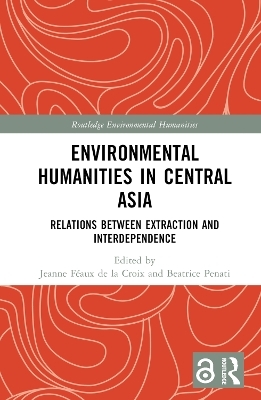
Environmental Humanities in Central Asia
Routledge (Verlag)
978-1-032-42341-8 (ISBN)
This book is the first collection to showcase the flourishing field of environmental humanities in Central Asia. A region larger than Europe, Central Asia possesses an astounding range of environments, from deserts to glaciated peaks.
The volume brings into conversation scholarship from history to social anthropology, demonstrating the contribution that interdisciplinary and engaged research offers to many urgent issues in the region: from the history of conservationism to the tactics of environmental movements, from literary engagements with ‘pure nature’ to the impact of fossil fuel extraction. The collection focuses on the Central Asian republics of the former USSR, where a complex layering of nomadic and sedentary, Turkic and Persianate, Islamic and Soviet cultures ends up affecting human relations with distinct environments. Featuring state-of-the-art contributions, the book enquires into human-environment relations through a broad-brush typology of interactive modes: to extract, protect, enspirit and fear. Broadening the scope of analysis beyond a consideration of power, the authors bring into focus alternative local cosmologies and the unintended consequences of environmental policy. The volume highlights scholarship from within Central Asia as well as expertise elsewhere, offering readers diverse modes of knowledge-production in the environmental humanities.
This book is an important resource for researchers and students of the environmental humanities, sustainability, history, politics, anthropology and geography of Asia, as well as Soviet and Post-Soviet studies.
Chapter 11 of this book is freely available as a downloadable Open Access PDF at http://www.taylorfrancis.com under a Creative Commons Attribution-Non Commercial-No Derivatives (CC-BY-NC-ND) 4.0 license.
Jeanne Féaux de la Croix is a social anthropologist based at the University of Bern, Switzerland. Beatrice Penati is a Lecturer in Russian and Eurasian history at the University of Liverpool, UK.
Introduction Part 1: Extractivism 1. There Used to Be Water: Soviet Water Policies, Archaeologists and Ethnographers in Central Asia 2. Administrations, Herders and Experts: Crossing Sources and Scales to Write a Social History of Overgrazing in Soviet Kazakhstan (1960-1980) 3. Environmental and Community Preservation in the face of Fossil Fuel Development: The Case of Berezovka, Kazakhstan Part 2: Paternalism and Protection 4. Saiga Antelopes (Saiga Tatarica) in the Environmental History of the Qazaq Steppe and Desert 5. To Tame, Improve, Protect: Environmental Discourse in Soviet Graphic Satire, 1950s-1991 6. What is in the Air? Citizen Science, Eco-Internationalism and Urban Air Pollution in Bishkek and Almaty Part 3: Enspirited Nature 7. Get Set! Horse Training as a Discontinuous Action: A Central Asian Physiology that Forces Nature, but is in Tune with the Seasons 8. Relating to People, Homeland and Environment the Kyrgyz Way? A Dialogue Between Activism and Engaged Scholarship 9. The Bee-Human: Imagining a New Qazaq identity in Oralkhan Bökei’s Novel Atau-Kere Part 4: Threats from Nature 10. Climate Disaster or Anticipated Crisis? Ways of Knowing the Environment in Pre-Soviet Central Asia 11. The Power of Apricot: Border Disputes, Land Scarcity and Mobility in the Isfara River Basin 12. Water and Irrigation Arrangements in the Pamirs of Tajikistan
| Erscheinungsdatum | 05.09.2023 |
|---|---|
| Reihe/Serie | Routledge Environmental Humanities |
| Zusatzinfo | 2 Tables, black and white; 9 Line drawings, black and white; 33 Halftones, black and white; 42 Illustrations, black and white |
| Verlagsort | London |
| Sprache | englisch |
| Maße | 156 x 234 mm |
| Gewicht | 628 g |
| Themenwelt | Naturwissenschaften ► Biologie ► Ökologie / Naturschutz |
| Sozialwissenschaften ► Soziologie ► Spezielle Soziologien | |
| Weitere Fachgebiete ► Land- / Forstwirtschaft / Fischerei | |
| ISBN-10 | 1-032-42341-2 / 1032423412 |
| ISBN-13 | 978-1-032-42341-8 / 9781032423418 |
| Zustand | Neuware |
| Informationen gemäß Produktsicherheitsverordnung (GPSR) | |
| Haben Sie eine Frage zum Produkt? |
aus dem Bereich


